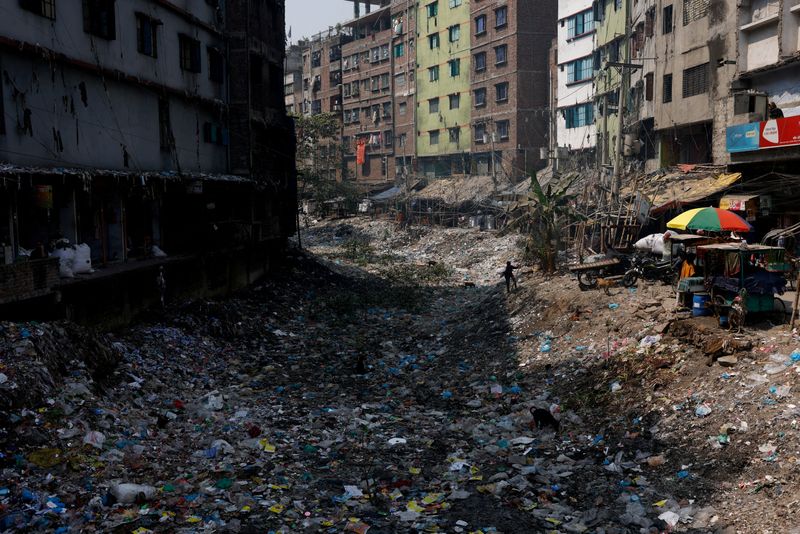After rough start, UN plastic treaty talks end with mandate for first draft
Reuters
Published Jun 02, 2023 05:59PM ET

By Valerie Volcovici
(Reuters) - After a rocky start to a week of negotiations, around 170 countries agreed to develop a first draft by November of what could become the first global treaty to curb plastic pollution by the end of next year.
Country delegations, NGOs and industry representatives gathered in Paris this week for the second round of UN talks toward a legally binding pact to halt the explosion of plastic waste, which is projected to almost triple by 2060, with around half ending up in landfill and less than a fifth recycled, according to a 2022 Organisation for Economic Co-operation and Development report.
Though the first half of the five-day negotiations was spent arguing over procedural issues, delegations split into two groups to discuss the range of control measures that can be taken to stop plastic pollution as well as whether countries should develop national plans or set global targets to tackle the problem.
By the session's close on Friday, countries agreed to prepare a "zero draft" text of what would become a legally binding plastics treaty and to work between negotiation sessions on key questions such as the scope and principles of the future treaty.
The "zero draft" text would reflect options from the wide-ranging positions of different countries by the start of the next round of talks to be held in Nairobi, Kenya, in November.
"My appeal to you at the beginning of this session was that you make Paris count. You have done so by providing us collectively with a mandate for a zero draft and intersessional work," said Jyoti Mathur-Filipp, executive secretary of the Intergovernmental Negotiating Committee (INC) on Plastic Pollution at the closing plenary.
The start of negotiations was bogged down by more than two days focused on the rules of procedure for the talks.
Saudi Arabia, Russia and China led objections to the treaty decisions being adopted by a majority vote rather than a consensus. A consensus would give one or a few countries the ability to block adoption.
Marian Ledesma, a campaigner with Greenpeace Philippines, told Reuters that if the INC process enables adoption by consensus instead of majority voting, it "will block a lot of important provisions."
"Voting allows for as many states as possible to be able to support the treaty and allow us to move forward," she said.
The issue has not yet been fully resolved and will come up at the next round of talks.
On Wednesday night, negotiators were able to move ahead on the substance of the talks, laying out their positions on whether plastic production should be capped, "problematic" plasitcs should be reduced and whether the treaty should set national targets or allow countries to set their own plans.
"We have no time to lose. Now we have less time to lose," said the representative of Samoa on behalf of small island nations at the talks on Wednesday, adding that island states face the harms of poor waste management and overproduction of plastic.
In informal group of countries called the "High Ambition Coalition," which includes EU countries as well as Japan, Chile and island nations, wants global targets to reduce plastic production and pollution as well as restrictions on certain hazardous chemicals.
Countries like the United States and Saudi Arabia have favored national plans rather than global targets to tackle the problem.

Tadesse Amera, co-chair of the International Pollutants Elimination Network, said with growing public concern about the plastic pollution crisis, the negotiations need to result in a strong agreement.
"The stakes are high, but we are optimistic by the growing awareness among delegates of the need for global controls on chemicals in plastics and for limits on plastic production," he said.
Written By: Reuters
Trading in financial instruments and/or cryptocurrencies involves high risks including the risk of losing some, or all, of your investment amount, and may not be suitable for all investors. Prices of cryptocurrencies are extremely volatile and may be affected by external factors such as financial, regulatory or political events. Trading on margin increases the financial risks.
Before deciding to trade in financial instrument or cryptocurrencies you should be fully informed of the risks and costs associated with trading the financial markets, carefully consider your investment objectives, level of experience, and risk appetite, and seek professional advice where needed.
Fusion Media would like to remind you that the data contained in this website is not necessarily real-time nor accurate. The data and prices on the website are not necessarily provided by any market or exchange, but may be provided by market makers, and so prices may not be accurate and may differ from the actual price at any given market, meaning prices are indicative and not appropriate for trading purposes. Fusion Media and any provider of the data contained in this website will not accept liability for any loss or damage as a result of your trading, or your reliance on the information contained within this website.
It is prohibited to use, store, reproduce, display, modify, transmit or distribute the data contained in this website without the explicit prior written permission of Fusion Media and/or the data provider. All intellectual property rights are reserved by the providers and/or the exchange providing the data contained in this website.
Fusion Media may be compensated by the advertisers that appear on the website, based on your interaction with the advertisements or advertisers.